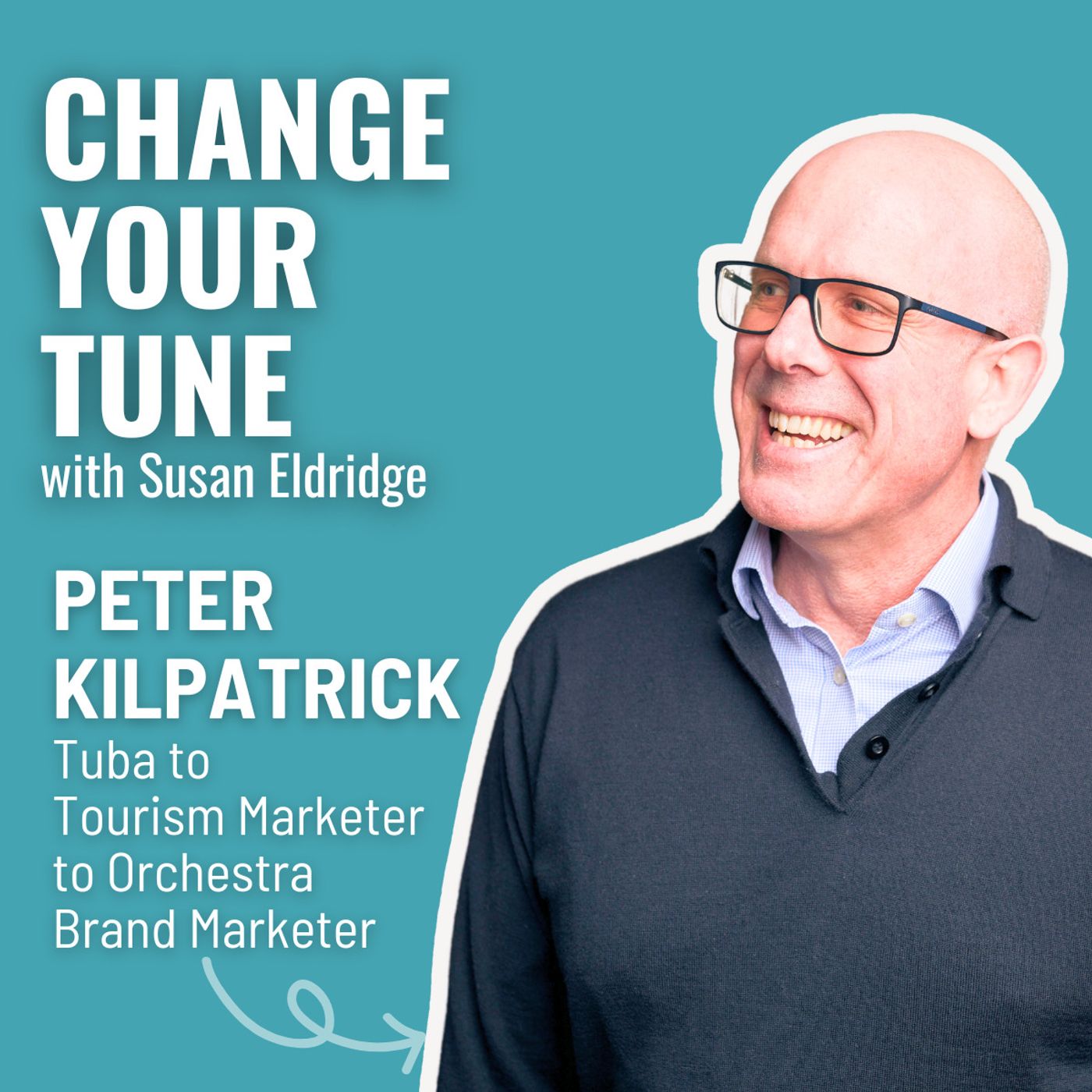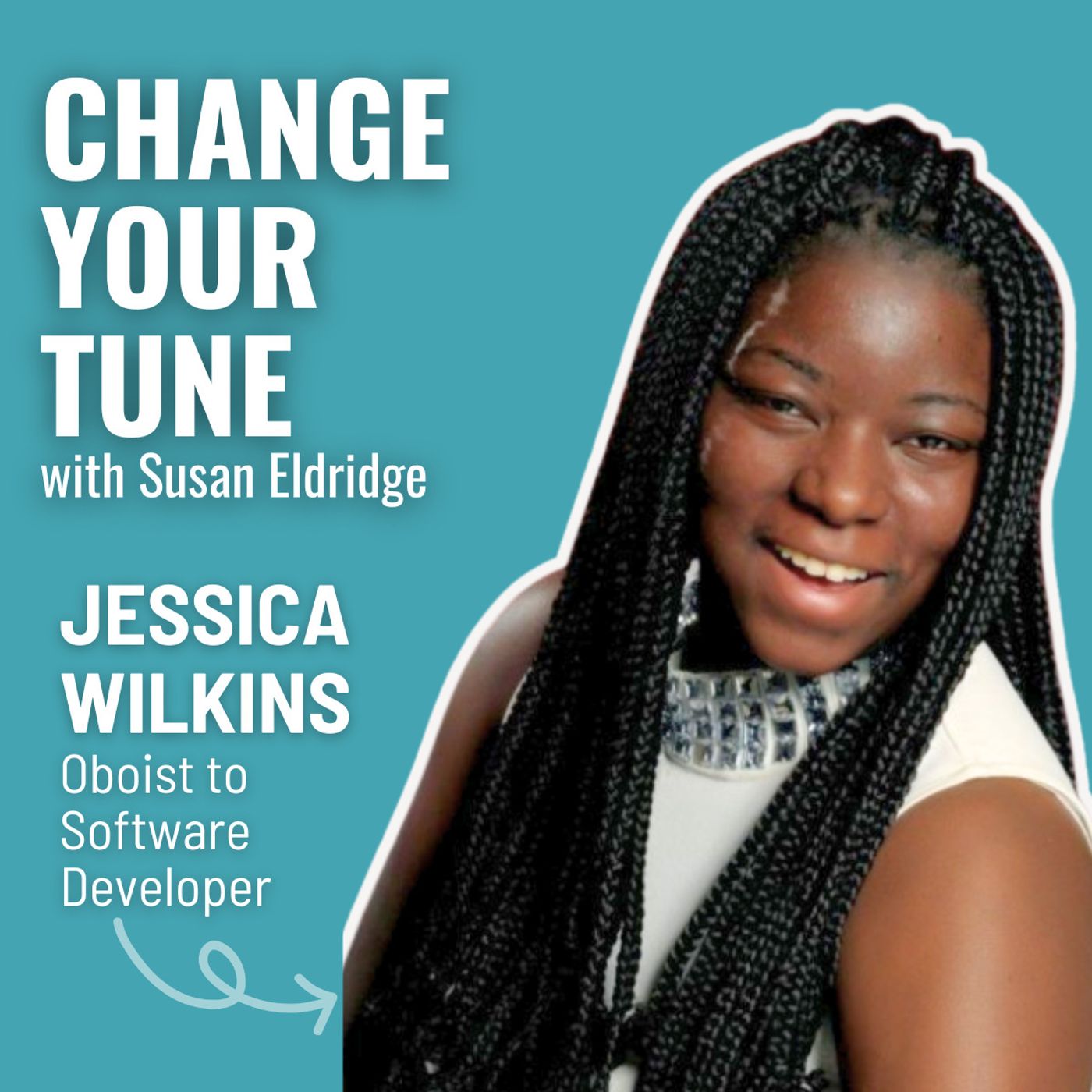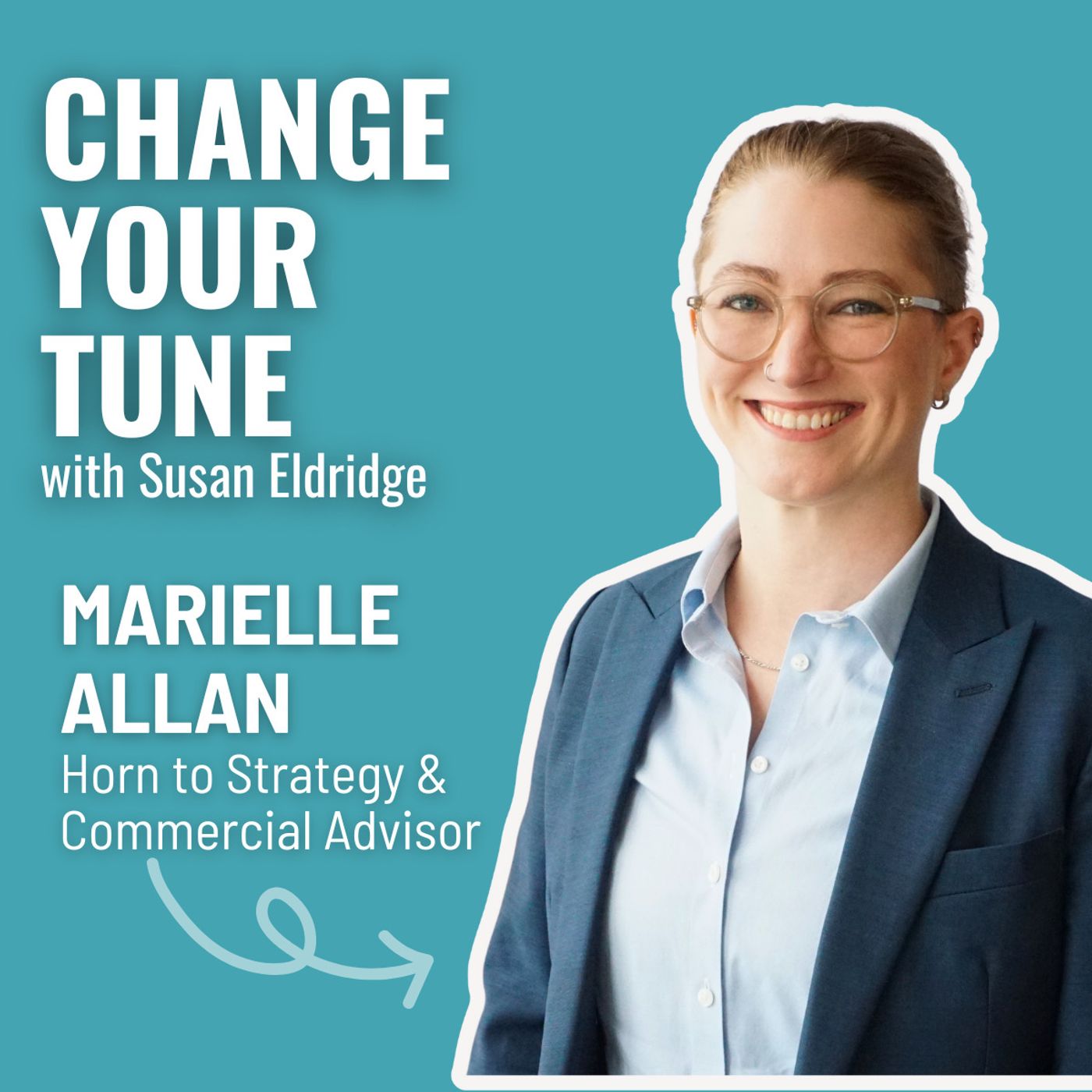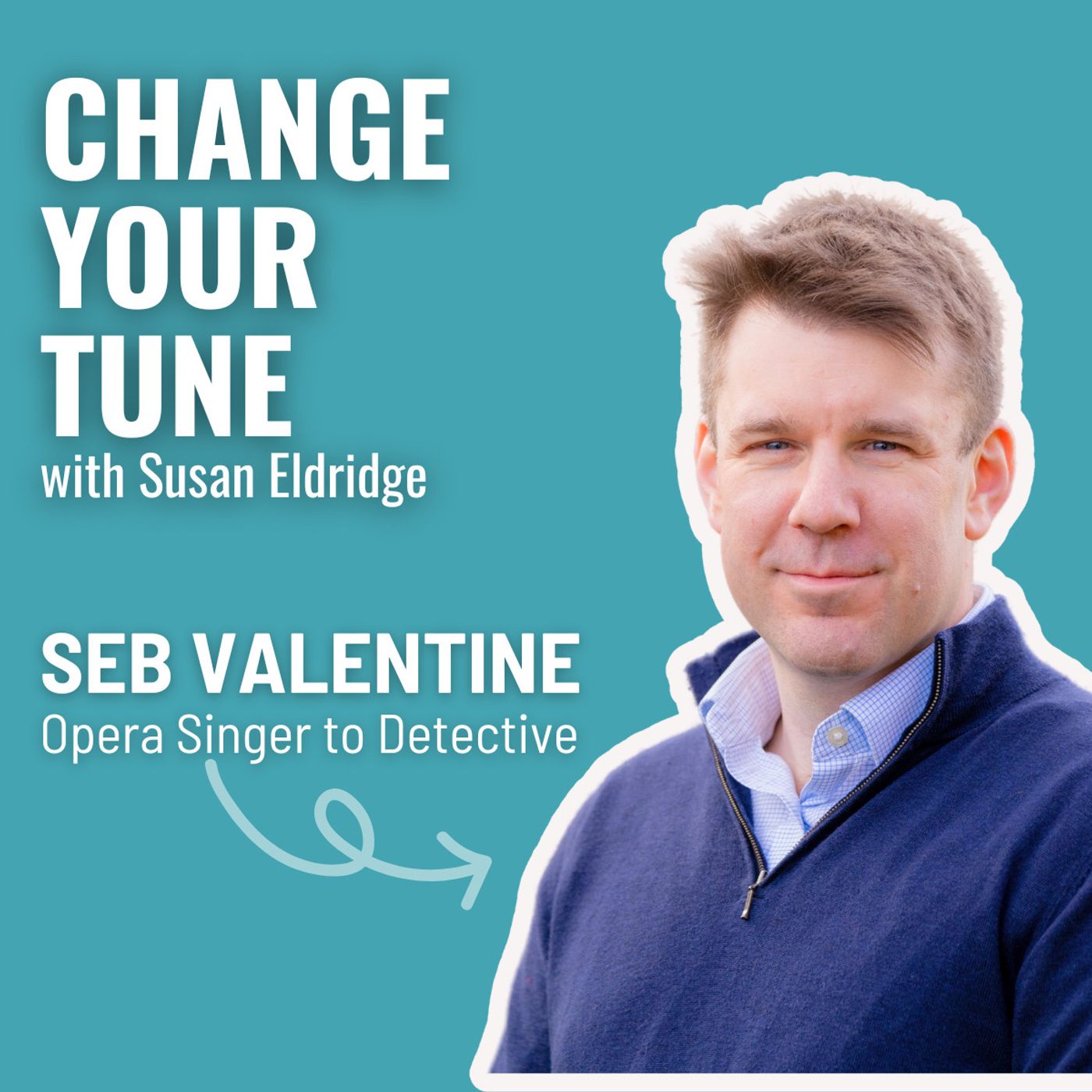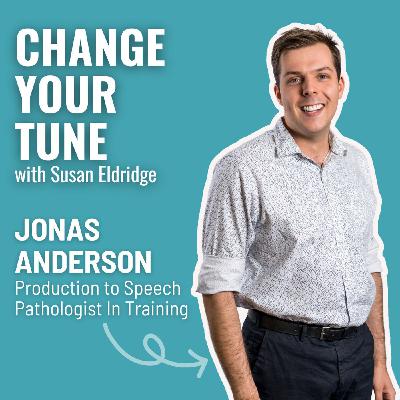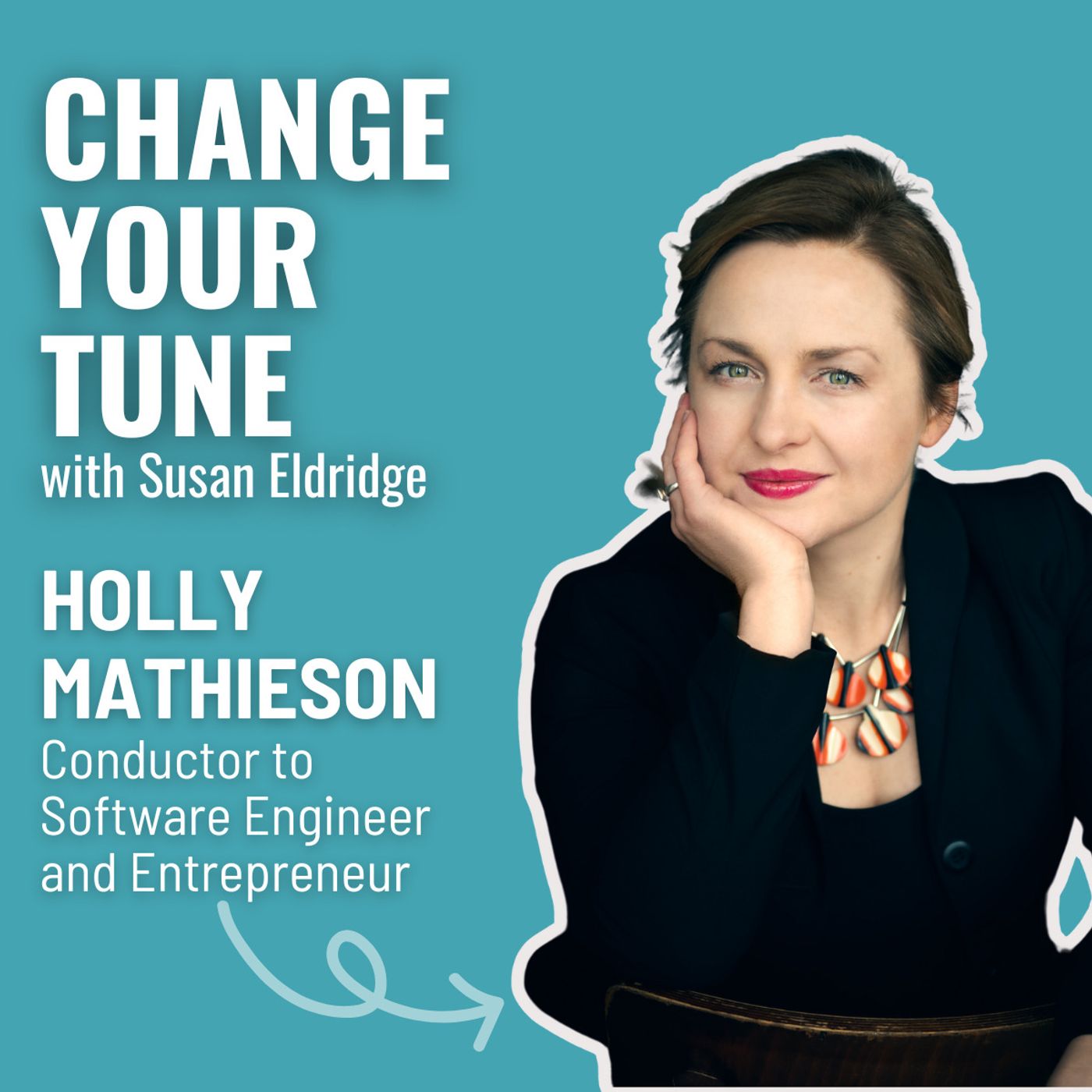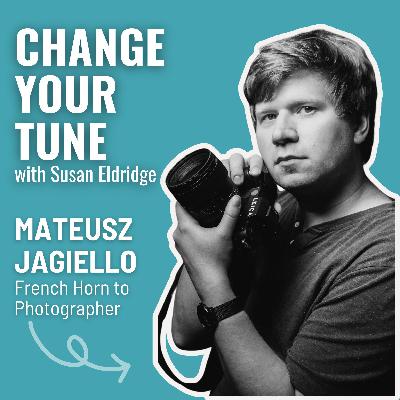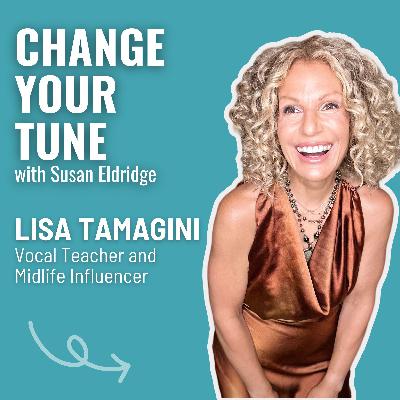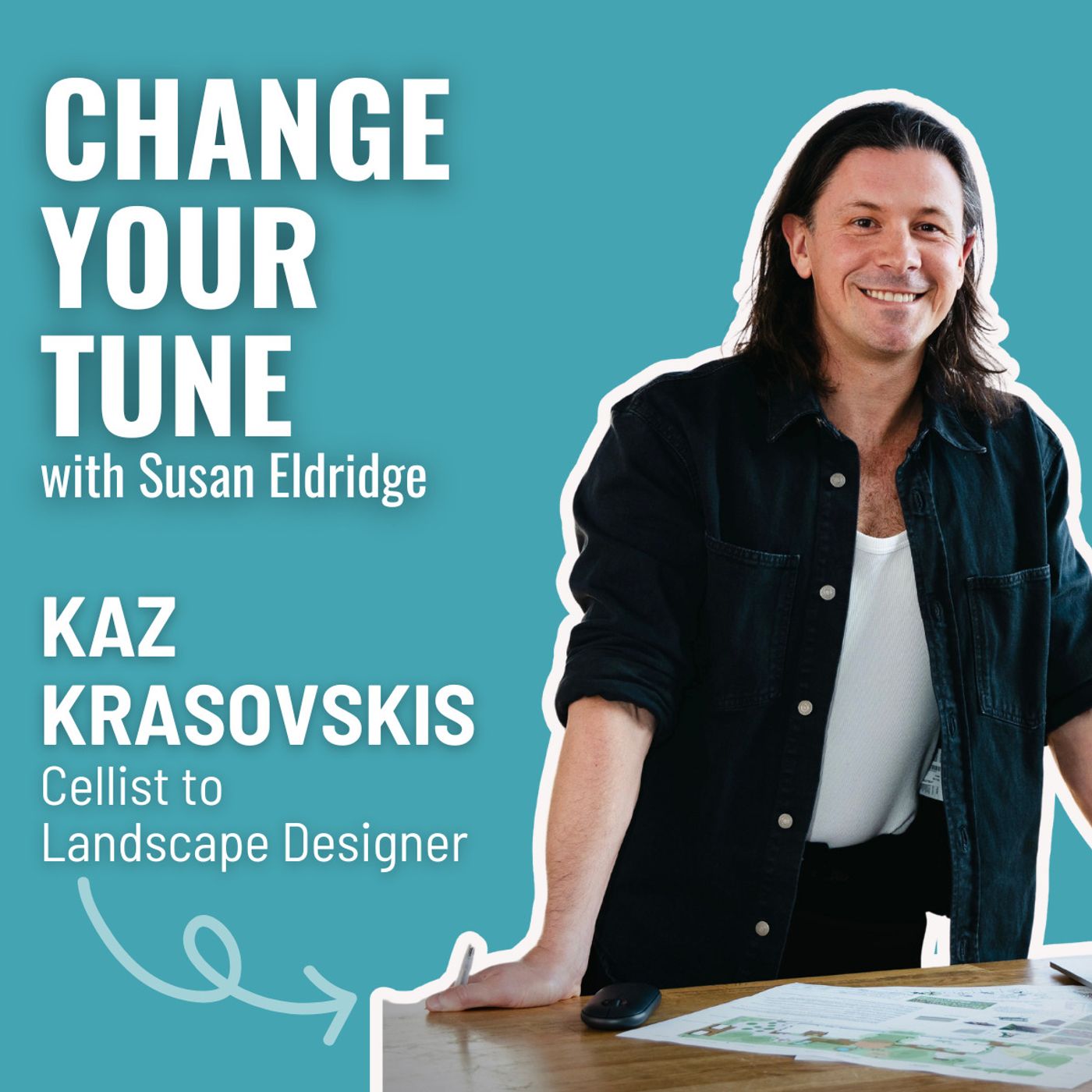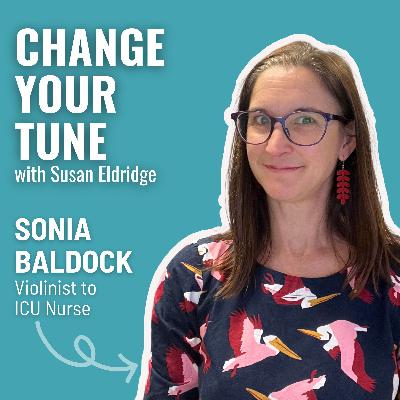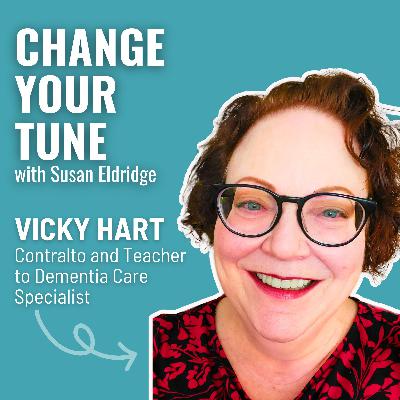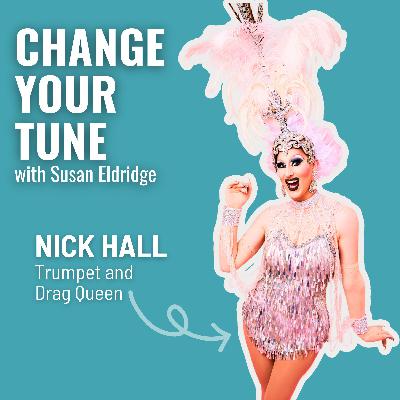Discover CHANGE YOUR TUNE
CHANGE YOUR TUNE

CHANGE YOUR TUNE
Author: Susan Eldridge
Subscribed: 6Played: 45Subscribe
Share
© 2021 Change Your Tune
Description
Incredible conversations with classical musicians about feelings (YES!), finding their value and career transitions.
Meet professional classical musicians now thriving as entrepreneurs, master craftsmen, counsellors, personal trainers, software developers, lawyers and more.
We need to NORMALISE the reality of underemployment, unemployment, career pivots and exits for classical musicians. Are you with me?
Think classical musicians only make music?
Think again.
#changeyourtune
Meet professional classical musicians now thriving as entrepreneurs, master craftsmen, counsellors, personal trainers, software developers, lawyers and more.
We need to NORMALISE the reality of underemployment, unemployment, career pivots and exits for classical musicians. Are you with me?
Think classical musicians only make music?
Think again.
#changeyourtune
52 Episodes
Reverse
ACKNOWLEDGEMENT OF COUNTRYI acknowledge the Wurundjeri Woi Wurrung people of the Eastern Kulin Nation as the Traditional Custodians of the land on which this podcast was recorded. I pay my respects to their Elders past and present, and I recognise their enduring connection to land, waters, and culture. Sovereignty was never ceded—this always was and always will be Aboriginal land.ABOUT PETERPeter Kilpatrick, Director of Audience and Experience at Tasmanian Symphony Orchestra since April 2023, has a rich background in arts administration and marketing, with roles at Tourism Tasmania, Opera Australia, and Australian Youth Orchestra. He holds qualifications in music, marketing, and public policy, and has served on various arts organisation boards.ABOUT THIS EPISODECan you imagine transforming burnout into a vibrant career reinvention? Join us as we unravel the inspiring journey of Peter Kilpatrick, Director of Audience and Experience at the Tasmanian Symphony Orchestra. From his early days as a classical musician to his roles with Opera Australia and the Australian Youth Orchestra, Peter's story is one of resilience and adaptability. After facing the challenges of burnout, Peter made the intriguing move into remedial massage therapy, only to find his way back into the arts via communications and marketing, ultimately shaping the brand identity of Tasmania. His experience offers a masterclass in turning life's detours into meaningful opportunities.Peter's journey isn't just about career pivots; it's also a deep dive into personal growth and leadership. Discover how a transformative leadership program inspired by Brené Brown reshaped his understanding of vulnerability, communication, and self-awareness. We delve into the importance of equipping young musicians with the skills necessary to navigate the competitive music industry, nurturing their potential for sustainable success. Peter shares insights into the power of reflective practice and the role of self-responsibility in fostering professional and personal growth.Explore the cultural impact of music beyond the stage, as Peter discusses his transition from massage therapy to marketing, and his contributions to Brand Tasmania. Learn how the Tasmanian Symphony Orchestra connects with diverse audiences and enriches community life, moving beyond traditional performances. Peter's passion for music and his enduring involvement with the Glenorchy City Concert Brass band highlight the profound impact music has had on his life's journey, celebrating his 35-year friendship and connections within the music sector. Tune in for an enlightening discussion that intertwines personal transformation with the vibrant cultural tapestry of Tasmania.LINKSFind Peter on LinkedIN PODCAST TEAMProduction Support and Audio Engineering by Thomas GraydenTheme Music Composed by Danna YunTheme Music Performed by Jasper Ly RECORDEDRecorded on 10 January 2025
ACKNOWLEDGEMENT OF COUNTRYThis episode was recorded in Tāmaki Makaurau. I acknowledge the mana whenua of Tāmaki Makaurau, Ngāti Whātua Ōrākei, and all iwi of this region. I honour the Indigenous people, their land, waters, and traditions. I also acknowledge their ancestors, the guardians of the past, and their present leaders.ABOUT DAVIDDavid is Principal Trumpet with the Adelaide Symphony Orchestra, and has also performed with the Tasmanian, Queensland and Melbourne Symphony Orchestras. He studied trumpet at the Queensland and Elder Conservatories, and also privately with Yoram Levy in Tasmania and Hannes Laeubin in Munich. Before earning a full-time position in the ASO, David enjoyed a12-year career in Orchestral Management and Production. David is married to ASO violinist, Janet Anderson, with whom he has two children, Ella and Billy.ABOUT THIS EPISODEDavid’s story takes a different path from many of our previous guests—rather than stepping away from performing, his journey is one of rising through the ranks within the orchestral world. We dive into his experiences with auditions and trials, exploring how years of working with the orchestra in various roles prepared him for this career-defining moment. David reflects on what it means to join an orchestra where he already felt at home, balancing the comfort of familiarity with the intense pressure of auditions.Our conversation unpacks the emotional weight of auditions and the value of honest, constructive feedback. We explore how musicians navigate intense scrutiny, learning to address critiques while holding onto their strengths. David shares the mix of relief and elation that came with finally securing his position after multiple attempts, underscoring the role of self-belief and internal readiness in meeting artistic expectations.Beyond performance, we also explore the less conventional career pathways in music—how stepping into operational roles within an orchestra can provide a fresh perspective. With experience on both sides, David challenges traditional boundaries between musicianship and administration, offering insights into the reality of balancing personal and professional life, particularly when both partners are musicians. Finally, we highlight the often unseen contributions of orchestra administrators, reinforcing the importance of collaboration, gratitude, and community in sustaining a thriving musical career. David’s story is a testament to resilience, passion, and the many ways musicians shape the orchestral world. PODCAST TEAMProduction Support and Audio Engineering by Thomas GraydenTheme Music Composed by Danna YunTheme Music Performed by Jasper Ly RECORDEDRecorded on 06 December 2024
ACKNOWLEDGEMENT OF COUNTRYI acknowledge the Wurundjeri Woi Wurrung people of the Eastern Kulin Nation as the Traditional Custodians of the land on which this podcast was recorded. I pay my respects to their Elders past and present, and I recognise their enduring connection to land, waters, and culture. Sovereignty was never ceded—this always was and always will be Aboriginal land.ABOUT JESSICA"I am an oboist turned software developer. When I was a musician, I founded and ran JDW Sheet Music and performed all throughout Southern California. As a developer, I create well maintained solutions that address business challenges. My hobbies include reading, and practicing oboe for fun."ABOUT THIS EPISODEJessica Wilkins, a musician turned tech enthusiast, joins us to share her fascinating journey from concert halls to coding. With a rich background from the Eastman School of Music and the University of Michigan, Jessica’s career in music was as vibrant as it was entrepreneurial. She ran a successful publishing company in Los Angeles, blending creativity, ambition, and adaptability in ways you wouldn’t expect.But then, something shifted. Her drive to advocate for Black artists in classical and jazz music sparked an unexpected pivot to tech. After building the Black Excellence Music Project website, Jessica discovered a passion for coding that led her to dive deep into online learning platforms. Faced with the choice between a high-profile gig at Disney or plunging into the tech world, she chose the latter—and hasn’t looked back.In this episode, Jessica reveals how her self-taught coding journey opened doors in software development. She shares why building real-world projects is key to showcasing your skills and how her transition from freelance musician to full-time tech role taught her the value of navigating team dynamics and setting healthy workplace boundaries. Stepping away from music also gave her space to cultivate personal growth and compassion, which has enriched both her professional life and her creative collaborations.LINKSFind Jessica on LinkedINblackexcellencemusicproject.com PODCAST TEAMProduction Support and Audio Engineering by Thomas GraydenTheme Music Composed by Danna YunTheme Music Performed by Jasper Ly RECORDEDRecorded on 13 January 2025
ACKNOWLEDGEMENT OF COUNTRYI acknowledge the Wurundjeri Woi Wurrung people of the Eastern Kulin Nation as the Traditional Custodians of the land on which this podcast was recorded. I pay my respects to their Elders past and present, and I recognise their enduring connection to land, waters, and culture. Sovereignty was never ceded—this always was and always will be Aboriginal land.ABOUT MARIELLEMarielle is an experienced strategist, having consulted for more than five years across the private and public sectors in a range of domains from transport to energy. Marielle began her consulting career at Strategy& (formerly Booz & Co) and now works as a commercial advisor at boutique outfit Coughlin Advisory.ABOUT THIS EPISODEMarielle shares her fascinating journey from the musical stages of the Queensland Conservatorium to navigating complex deals that promote renewable energy in New South Wales. We explore how the collaborative and structured environment of music parallels her current role, where teamwork, strategic planning, and a supportive culture are crucial. Her story offers a unique perspective on balancing macro and micro views in business and music, making for a compelling narrative on the value of diverse experiences.Listen in as we discuss the emotional and psychological challenges faced by musicians and how these translate into the corporate world. We examine the rigid nature of classical music training and its impact on risk tolerance and emotional skills. Marielle shares insights into the valuable skills musicians bring to the table, like receiving feedback dispassionately, while also highlighting the need for emotional intelligence in professional environments. This conversation underscores the importance of holistic development, blending technical proficiency with emotional resilience for effective collaboration.Finally, we explore the courage required to transition between careers, likening the process to mastering a musical instrument. Marielle shares her experiences of embracing the unknown and finding freedom in exploring new career paths. We reflect on the intersection of leadership and creativity, emphasizing the importance of technical skills and self-assurance. Through Marielle's story, we learn about the power of self-determination and fulfillment, and the lessons learned during the pandemic about focusing on actionable steps.PODCAST TEAMProduction Support and Audio Engineering by Thomas GraydenTheme Music Composed by Danna YunTheme Music Performed by Jasper Ly RECORDEDRecorded on 13 January 2025
ACKNOWLEDGEMENT OF COUNTRYI acknowledge the Wurundjeri Woi Wurrung people of the Eastern Kulin Nation as the Traditional Custodians of the land on which this podcast was recorded. I pay my respects to their Elders past and present, and I recognise their enduring connection to land, waters, and culture. Sovereignty was never ceded—this always was and always will be Aboriginal land.ABOUT KATHARINEUntil 2020, Kate was an international opera singer, and during her travels was exposed to varieties of vegetables that were brand-new to her. She became passionate about wanting to bring not only variety to the Australian table but also the quality and nutrient density that becomes possible with a shift towards local production and regenerative agricultural practices. Covid made Kate realise the importance of food security has never been more evident and she decided that she wanted to contribute to Australia’s ability to achieve it.ABOUT THIS EPISODEWhat happens when an opera singer trades the spotlight for soil, building a life centered around sustainability and self-sufficiency? Katharine Tier, a talented musician and business owner, shares her compelling journey from a high-profile opera career in Europe back to her roots in Tasmania, Australia. Faced with the challenges of establishing a regenerative farm during the COVID-19 pandemic, she and her husband Florian navigated the unpredictable world of sustainable farming and business ownership. From initial ventures into veggie boxes to thriving with their seed company, Seed Freaks, Katharine opens up about adapting to new environments and finding resilience through community support and personal growth.But the journey wasn't without its hurdles. Katharine reveals the intricacies of maintaining seed purity amidst an ecosystem of possums, wallabies, and coastal winds. Her candid insights into these experiences offer a glimpse into the relentless yet rewarding path of sustainable farming. Beyond agriculture, Katharine reflects on overcoming personal struggles, including an eating disorder, and emphasizes the importance of vulnerability as a source of strength. This episode delves into her evolution from performer to farmer, highlighting transferable skills and the significance of collaboration in building a more sustainable, ethical lifestyle.Katharine's passion for music and education remains a vibrant part of her story, as she recounts memorable musical projects like performing Mahler's Symphony No. 2 in Tasmania. Balancing her artistic pursuits with postgraduate studies in counseling, she shares her dedication to ethical artistry and the importance of addressing societal challenges, such as mental health and generational issues. Through her experiences, Katharine demonstrates the transformative power of collaboration, respect, and a commitment to future-proofing emotional well-being as cornerstones of a healthier society. Join us for an inspiring narrative that underscores the interconnectedness of art, agriculture, and personal development.IMAGE CREDITAndrew Finden LINKSKatharine on FacebookSeed Freaks on FacebookQuintessence on Facebook @katharinetier on Instagram@seedfreaks on Instagram@quintessence_voices on Instagram PODCAST TEAMProduction Support and Audio Engineering by Thomas GraydenTheme Music Composed by Danna YunTheme Music Performed by Jasper Ly RECORDEDRecorded on 15 January 2025
ACKNOWLEDGEMENT OF COUNTRYThis episode was recorded in Tāmaki Makaurau. I acknowledge the mana whenua of Tāmaki Makaurau, Ngāti Whātua Ōrākei, and all iwi of this region. I honour the Indigenous people, their land, waters, and traditions. I also acknowledge their ancestors, the guardians of the past, and their present leaders.ABOUT SEBFollowing a childhood dominated by music, Seb left Bristol to study singing at the Royal College of Music, London. After struggling to make it as an opera singer, he joined the police in 2011. He now combines music and policing with his charity, the Blue Light Symphony Orchestra. ABOUT THIS EPISODEJoin me on an inspiring journey as I sit down with Seb Valentine, a police officer in the UK who shares his unique career path from a professional musician to a member of the Surrey Police. Seb offers a fascinating look into his current role as a staff officer for the chief constable, where he gains rare insights into leadership and organizational management. With a background as a detective sergeant specializing in domestic abuse cases, Seb has worn many hats in the policing world. But that's not all—his life is also steeped in music, having studied singing at the Royal College of Music and working as a freelance opera singer before embarking on his law enforcement career. Listen in as we explore how Seb manages to balance these dual passions, drawing leadership lessons from both conducting and policing.Explore Seb's transformative journey from music to law enforcement, sparked by a change of heart during his university years. Originally set to pursue physics, Seb embraced his musical passion, which eventually led him to the Royal College of Music. While the life of a baritone was rewarding, the unpredictable nature of freelance work pushed Seb toward volunteering as a police officer. This role satisfied his childhood fascination with emergency services and allowed him to make a meaningful impact in his community. In our conversation, Seb reflects on how these experiences have shaped his approach to both music and policing, finding fulfillment in bridging these two worlds.Finally, discover how Seb's musical talents have found a new purpose in the emergency services. Seb recounts his journey from organizing local choirs to founding an orchestra for police personnel, designed to accommodate their demanding schedules. Through this unique ensemble, Seb has been able to foster a community that combines the structured interaction of music with the high-stakes environment of emergency services. The parallels between conducting and police leadership are explored, emphasizing the strategic direction and attention management required in both fields. Seb also shares the therapeutic potential of music, spotlighting a charity initiative that leverages music as a healing tool for those in emergency services. Don't miss this episode filled with inspiring stories and valuable insights into the power of music and leadership.LINKSFind Seb on LinkedINPODCAST TEAMProduction Support and Audio Engineering by Thomas GraydenTheme Music Composed by Danna YunTheme Music Performed by Jasper Ly RECORDEDRecorded on 29 November 2024
ACKNOWLEDGEMENT OF COUNTRYThis episode was recorded in Tāmaki Makaurau. I acknowledge the mana whenua of Tāmaki Makaurau, Ngāti Whātua Ōrākei, and all iwi of this region. I honour the Indigenous people, their land, waters, and traditions. I also acknowledge their ancestors, the guardians of the past, and their present leaders.ABOUT JONASJonas spent a decade supporting orchestras, ballet, and theatre in Australia and Aotearoa New Zealand as a stage and production manager. He is now a peer worker for autistic youth, occasionally consults on disability access, and is completing a Masters of Speech Pathology.ABOUT THIS EPISODEJoin us for an enlightening conversation with Jonas Anderson as we explore his remarkable career transition from arts administration to pursuing a Master's in Speech Pathology. Jonas shares the motivations behind his mid-career shift, reflecting on his passion for helping others with speech, communication, and swallowing issues. With a background as a stage and production manager, Jonas draws connections between his past experiences with orchestras and opera companies and his current studies, emphasizing the importance of self-advocacy and quality of life in his new field.Listen in as Jonas recounts the pivotal moments that influenced his career path, including his work with the Melbourne Symphony Orchestra and his decision to pursue a graduate diploma in human resource management during the COVID-19 pandemic. This journey highlighted the challenges and limitations within arts administration, leading Jonas to recognize the misalignments within the sector and inspiring him to create inclusive opportunities that celebrate all voices. His experiences promoting First Nations artists and supporting self-advocacy have been instrumental in shaping his new focus.Susan joins the discussion to highlight the importance of balancing work, trauma, and personal life. Together, they explore how creativity intersects with healthcare, underscoring the role of empathy and understanding in both fields. The episode concludes with a reflection on the power of positive work culture, emphasizing gratitude and the impact of bringing out the best in colleagues. This engaging dialogue offers valuable insights into career transitions, creativity, and the pursuit of a fulfilling professional life.LINKSFind Jonas on LinkedIN IMAGE CREDIT(c) Latitude Creative, 2021 PODCAST TEAMProduction Support and Audio Engineering by Thomas GraydenTheme Music Composed by Danna YunTheme Music Performed by Jasper Ly RECORDEDRecorded on 11 November 2024
ACKNOWLEDGEMENT OF COUNTRYThis episode was recorded in Tāmaki Makaurau. I acknowledge the mana whenua of Tāmaki Makaurau, Ngāti Whātua Ōrākei, and all iwi of this region. I honour the Indigenous people, their land, waters, and traditions. I also acknowledge their ancestors, the guardians of the past, and their present leaders.ABOUT HOLLYHolly Mathieson enjoyed an award-winning career as a conductor, regularly working with opera houses, ballet companies and orchestras in Europe, Australasia and North America, and recording for BBC, CBC and Decca. She recently retrained as a Software Engineer and Web Developer, and now runs Scordatura, a digital company building tools for music, musicians and audiences.ABOUT THIS EPISODETech entrepreneur and music director Holly Mathieson reveals how she’s orchestrating a new harmony between classical music leadership and digital innovation. Holly offers an insider's look at her journey from the traditional world of conducting to the dynamic realm of tech, where she’s building platforms to empower classical music enthusiasts. Her innovative approach during the pandemic and her experiences in Canada and the UK illustrate the exciting evolution of music leadership, as she champions shared leadership within orchestras and reimagines the conductor's role.Listeners will gain a unique perspective on the parallels between music and coding as Holly reflects on her transition from ballet to tech. She shares her contemplative journey through the challenges of leaving behind familiar artistic environments and connections, and her curiosity about the vibrant personalities she'll encounter in the tech industry. Holly’s insights offer a compelling look at the personal and professional impacts of anxiety, the relief the pandemic inadvertently provided, and the clarity it brought to her life as she navigated significant transitions with grace and courage.The conversation takes an inspiring turn as Holly discusses the creation of safe spaces for musical expression and leadership development. Her transformative work with the Nevis Ensemble and orchestras in Canada showcases the power of fostering supportive environments and challenging traditional hierarchies. Through candid reflections on vulnerability and reimagining possibilities, Holly not only offers a refreshing perspective on leadership but also highlights the profound personal and collective growth that can emerge within the creative community.LINKSwww.instagram.com/scordatura_digital/ www.facebook.com/ScordaturaDigital www.linkedin.com/in/hollymathieson/ www.hollymathieson.comwww.scordatura.io IMAGE CREDITMartin Stewart PODCAST TEAMProduction Support and Audio Engineering by Thomas GraydenTheme Music Composed by Danna YunTheme Music Performed by Jasper Ly RECORDEDRecorded on 22 November 2024
Mateusz was born and raised at the dawn of the internet and digital revolution. A camera is not only an instrument in his hands – it’s also his weapon of choice in destroying people’s insecurities. He simply refuses to take photos without a deeper, more organic, and authentic connection. QUOTESOn how rigid expectations limit individualityMat explains how the traditional music education system discourages individual expression and creativity, pushing musicians to conform to specific interpretations. He reflects on the inherent conflict this created, saying, "I always play other people's music… it’s not my music. And then, even if I have my own personal interpretation… I cannot play like that because… I’m never going to win a job." On freedom and self expression Mat’s move into photography brought with it a renewed passion that he didn’t experience in his musical training. He states, "Studying philosophy… connected to it, and then the same became about music… I got just interested… and started craving more of it." On embracing connection over ego Mat speaks to a transformation in his approach to art and work, shifting from a self-centered focus to one centered on connection and service to others. He says, "To me, art in general is about building bridges and not walls." On listening and presence to build trust For Mat, the art of listening has become central in his work, especially in building trust with clients in boudoir photography, which requires sensitivity. He explains, "The thing I'm most grateful for from music is listening...the more I do [photography], the more I realize that it's much more about listening than looking." LINKSFind Mateusz on his website and Facebook IMAGE CREDITKonrad Rudowicz PODCAST TEAMProduction Support and Audio Engineering by Thomas GraydenTheme Music Composed by Danna YunTheme Music Performed by Jasper Ly RECORDEDRecorded on 08 November 2024
Lisa Tamagini is a New York City based Vocal Technique instructor. After a nearly 30 year singing career, the global pandemic’s impact on the industry as a time to delve into her passion for inspiring midlife women to embrace this chapter with vitality, style and a zest for reinvention.She expresses this branch of her teaching through her social platforms @lisatandthecity and @theproageproject which is a collaboration with 5 other influencers in the Midlife Space. QUOTESOn Embracing a Non-Linear JourneyLisa emphasizes that success in the arts is rarely a straight path and often involves exploring various roles and experiences. She reflects on her own journey, stating:“I realized that singing was never my passion, communication was.” The Transformative Power of TeachingThrough her experiences, Lisa discovered that teaching can be as fulfilling as performing. She found joy in enabling others to find their voices, which mirrors her own artistic journey.“I realised that I loved teaching more than singing, and that I was at least as talented at that as I ever was at singing.” Boredom as a Guide in Creative EndeavorsLisa highlights the importance of personal engagement in both her content creation and her students' performances. She uses boredom as a signal that she’s not in the right space, indicating that if she feels bored, it’s time to reevaluate her direction. She notes:“If I'm flipping through a bunch of content creators that seem to be having this amazing success... I just know. Well, that’s not the conversation that needs me. I'm not contributing there because it just isn't necessary.” LINKFind Lisa on Instagram and TikTokFind Lisa’s Voice Studio on her website PODCAST TEAMProduction Support and Audio Engineering by Thomas GraydenTheme Music Composed by Danna YunTheme Music Performed by Jasper Ly RECORDEDRecorded on 04 November 2024
With his signature sensitive, organic approach to landscape design, Kaz has designed countless beautiful gardens throughout Melbourne and regional Australia. Informed by experience working in prestigious gardens in Europe including ‘Great Dixter’ and ‘Hermannshof’, Kaz creates gardens tailored to local Australian conditions, with a fresh, international perspective. QUOTES On balancing accessibility with depth in communication Kaz discusses the skill of simplifying complex ideas to make them accessible to different audiences but also highlights the challenge of feeling that, in doing so, one might dilute the depth of the content. This insight reflects the tension educators and communicators face between clarity and substance. “You’re sort of making the information so digestible and so relatable that it almost appears like you’re not delivering anything at all.” On navigating career choices and fulfillment Kaz shares a personal experience of realizing that certain career paths might not be fulfilling in the long term, even after significant training and effort. His insight underlines the importance of reassessing one’s happiness and alignment with the chosen work, especially when it may become repetitive or limiting. “As much as I absolutely hated it, because I really wanted to have a career that I could continue on with, I decided that [Alexander Technique] wasn’t going to be my career.” On the impact of personal setbacks on professional choicesKaz reveals how an ending personal relationship led him to reconsider his professional path. This insight illustrates the profound effect personal life events can have on career decisions, reminding us that professional journeys are often deeply intertwined with personal experiences. “It was the end of a relationship… and I think it had become clear to me that Alexander Technique was not going to be something that was going to work for me.” LINKSFind Kaz on his website, Instagram or Facebook IMAGE CREDITAlexander Sartor PODCAST TEAMProduction Support and Audio Engineering by Thomas GraydenTheme Music Composed by Danna YunTheme Music Performed by Jasper Ly Recorded on 01 November 2024
Sonia began playing violin at the age of 9 and knew it would be a part of her life forever. After 15 years, however, she made the shift to nursing. She now has the best of both worlds - a job she loves, and a hobby that she is passionate about. And a renewed love of music. QUOTES “I've learned to become very courageous because it turns out what I want is not necessarily what the world has planned for me.” On financial insecurity “I realised that probably the last year or so had turned into picking up gigs just because they would pay my rent, not because they were musically satisfying.” On realising care could be a career “I said, I'll never be a nurse because I'm a germaphobe. Long story short, I became really unwell. My nervous system was chronically activated and I was hospitalised a couple of times. I thought maybe I'll become a doctor. Maybe I'll study medicine.” On finding a love of science“I wanted to be a cardiac nurse. I really liked it because the patients were generally quite physically well. I understand how the heart works, you know it's a pump, and it's electrics. It makes sense to me. But when things go wrong they go wrong big. And as a performer, I like a bit of drama and really getting into the nitty gritty of learning new things. So I went back to uni and realised science is amazing!” On playing with Corpus Medicorum“So I didn't know at the time I was only playing professionally that I was just in the middle of all of this nervous system hyperactivation. I didn't know until I picked up my violin again in this group and played again that I'd lost the joy, and now I have it back.” LINKSWilliam (Bill) HennessyCorpus MedicorumFind Sonia on LinkedIN or Instagram PODCAST TEAMProduction Support and Audio Engineering by Thomas GraydenTheme Music Composed by Danna YunTheme Music Performed by Jasper Ly Recorded on 21 October 2024
Lisa's life through high school was dedicated to becoming a violinist. But her time at New England Conservatory uncovered her love for "making things happen", leading her through multiple career changes. In every role, Lisa's musical training has always played a part in making her "dream impact": designing systems that empower collaboration. QUOTESOn the pressure of fulfilling others' dreams.“It took me a while... to not feel like a failure. Having gone to a music school, and then, not having come out as an active performer. ” On the importance of seeking dream impact, not a dream job.“When I'm looking for a new job, I want to make sure it’s a place where experimentation and exploration is encouraged and embraced, so I can make mistakes, and come out stronger on the other end.” On the importance of finding personal fulfillment in her career.“I was pleasantly surprised to discover that people were actually intrigued by my music background. They found that actually helped me stand out from the candidates.” LINKSFind Lisa on LinkedINNew England Conservatory Entrepreneurial Musicianship Department, founded by Angela Beeching and formerly led by Rachel RobertsNew England Conservatory Community Engagement and Professional Studies Department, led by Tanya Maggi IMAGE CREDITNicolas Zurcher PODCAST TEAMProduction Support and Audio Engineering by Thomas GraydenTheme Music Composed by Danna YunTheme Music Performed by Jasper Ly Recorded on 04 October 2024
Victoria Hart is the Founder and Director of A Gathering of Minds, an innovative, online program for people with early stage memory loss. A Gathering of Minds meetings provide fun and intellectually stimulating programs that engage, intrigue, enliven, and reconnect people with their authentic selves. QUOTESOn the connection to voice and self“Losing one's voice is much more than losing the ability to sing.You lose your orientation to yourself. And I had not been informed that this was going to happen.So it was quite a deep dive into feeling desperate. I could have left singing, I could have gone into musicology, but I wanted my voice. I wanted my voice back, and I was willing to fight for it."On voice health and wellbeing“I'm not interested in the prettiest sound you could make. I'm interested in the healthiest sound you can make. And if that's uglier today, I don't care, because the potential for the healthy voice is limitless. But if you are 17 years old and stuck on making the prettiest sound you can make as a 17-year-old, you're not gonna grow.”On working with people with dementia"As a musician, as a singer, as a teacher, the deepest listening that you can do, listening for something that I can grab onto and pull forward in these people, and it's like buried treasure. I mean, the stuff that comes out of people is, and sometimes a witty, witty comment.” LINKSFind Vicky at A Gathering of Minds or on LinkedINAlive Inside documentary PODCAST TEAMProduction Support and Audio Engineering from Thomas GraydenTheme Music Composed by Danna YunTheme Music Performed by Jasper Ly Recorded on 30 August 2024
Nick Hall (otherwise known as Anita Wigl’it) is arguably one of New Zealand’s most popular Drag Queens. With a career that spans both the screen and stage Wigl’it is constantly travelling New Zealand and further afield delighting audiences with her special brand of comedy and outrageous personality. QUOTESOn being a childish adultAnd I feel like when we're growing up, our parents often say ‘Oh, you've got to behave! Don't act so stupid. Grow up’. And drag is the opportunity to be like, no, actually, I'm gonna be really stupid. I'm going to act like a child, and I'm going to bring my audience with me.” On being your own manager“I'm all by myself, and doing everything by myself. But then I realised, actually, I think it's the most wonderful thing because I’m in control of my future. And I can do everything that I want to. The reason I self manage myself is because there's no one in the world that has my best interests at heart other than myself.” On giving it all“Sometimes we’ll have a night and the audience don’t seem very enthused, then afterwards they say ‘This was the best night we’ve ever had.’” LINKSFind Nick on Anita Wiglet or Instagram PODCAST TEAMProduction Support and Audio Engineering by Thomas GraydenTheme Music Composed by Danna YunTheme Music Performed by Jasper Ly Recorded on 14 October 2024
Welcome back! This episode introduces the eight guests for this season and gives you a chance to listen to sneak clips from the episodes.Nick Hall Trumpet to Drag ArtistVicki Hart Vocal Teacher to Therapist and Dementia Care PractitionerLisa Bauer Violinist to Operations Optimization ExpertTim Ball French Horn to Yacht CaptainSonia Baldock Violinist to ICU NurseKaz Krasovskis Cellist to Landscape DesignerLisa Tamagini Vocal Teacher and IG InfluencerMateusz Jagiełło French Horn to Boudoir Photographer IMAGE CREDITLulu & Lime PODCAST TEAMProduction Support and Audio Engineering by Thomas GraydenTheme Music Composed by Danna YunTheme Music Performed by Jasper Ly Recorded on 08 November 2024
Paul Bruch-Wiens is a Private Wealth Manager at Quadrant Private Wealth, based in Winnipeg, Manitoba, Canada, where he lives with his spouse, two children and still has a deep passion for the performing arts.QUOTES“Singing in close harmony with my family and church community was a way of life. It was something you just did every Sunday.”“After I finished a business degree, the only thing I could do to have gainful employment based on the training was to be a bookkeeper. But I’d already done that for 3 years as a part time job. It wasn’t interesting to me. So instead I studied for a Master of Music.”“There was no job lined up for you coming out of music school, but I adamantly chose not to be a music teacher.”“I got the job (in a bank) and thought it would solve everything. But it didn’t. It was really difficult to come to terms with making the wholesale change. In my heart of hearts I was still a performer and the reality of the situation had not caught up with me. I just didn’t believe it. I perhaps thought I would go back.”“I have all of these things to pull experience from. People don’t necessarily want advice from people who haven’t felt that themselves”“It’s liberating when you find yourself, and let go of who you think you should be.”LINKSFind Paul on LinkedINPODCAST TEAMProduction Support from Molly Jenkins Audio Engineering from Frazer RuddickTheme Music Composed by Danna YunTheme Music Performed by Jasper LyRECORDEDRecorded on 21 October 2021
A former professional oboe and cor anglais player based in London, Sadah Webster now works as an investigator and intelligence analyst. Investigating whistleblower complaints and misuses of public office.QUOTES“I was halfway through a Bachelor of Music degree when I took a year off to study linguistics and live in Thailand.”“I didn’t know what I was doing, I was petrified all the time and I was burned out.”“Looking back, emotionally, I think the fact that I was advanced as a player quite early on and I got thrown into a lot of stuff which was great for my playing but emotionally I wasn't ready.”“Because I had solely focussed on being an Oboist, I didn’t know anything else.”“I had various attempts at retraining, but a sense of purpose came much later in my emotional journey.”“As a freelancer, you never know why you don’t get booked.”“The context in which we learn perpetuates “there’s something wrong with me” and the same toxic productivity runs through the law school as in music school.” “Assumptions are being made about your work ethic, motivation and ability to use your time. I had been told by various teachers that I was lazy when I couldn't practice more because instead I had to work to earn a living.”“The only tool the teachers have is “well just practice more”.“The work was more stressful than enjoyable, the balance had totally shifted and I was just exhausted.”“The cost benefit analysis of being an oboist doesn’t make sense, but I didn’t know how to make that assessment when I was studying.”LINKSFind Sadan on LinkedINPODCAST TEAMProduction Support from Molly Jenkins Audio Engineering from Frazer RuddickTheme Music Composed by Danna YunTheme Music Performed by Jasper LyRECORDEDRecorded on 24 October 2021
Daniel Meyers is a bass player, music administrator, and professional fundraiser who currently manages donor relations and annual giving at the Epilepsy Foundation of Minnesota. Before moving into fundraising, Daniel performed regularly as a substitute with the Chicago Symphony Orchestra, and he was a member of the Civic Orchestra of Chicago.QUOTES“I was playing with orchestras that were “the end goal” if you’re searching for a career as an orchestral musician, but I wasn’t finding the connection and focus on the audience and that focus on the audience. That’s what I care about.”“I never heard or rarely heard musicians talk about the experience of the audience. And I felt like the people I was playing with didn’t care that much.”“I don’t think you can expect something that someone does full time, that it can't be a job just some of the time.”“You have this great opportunity and people are congratulating you, your peers are congratulating because you’ve achieved their dream. You feel like you should be on top of the world and you’re not. This is what I was hoping for and it’s really not all that”"It was just a job for a lot of them."LINKSFind Daniel on LinkedINUnsupervised EnsembleAubrey BergauerRuth HarttSt Olaf CollegePODCAST TEAMProduction Support from Molly Jenkins Audio Engineering from Frazer RuddickTheme Music Composed by Danna YunTheme Music Performed by Jasper LyRECORDEDRecorded on 08 October 2021
Sarah Denholm was originally a classical pianist who moved into a successful career as a speaking and presentation skills coach, built after suffering from performance anxiety.Sarah’s pathway back to comfort on stage was learning the art of public speaking. She now helps others globally through her Speakers Confluence® confidence and influence coaching and training programs.QUOTESOn performing and imposter syndrome “I found it so stressful, and that’s still in my body.”On being seen “I’ve had to learn how to overcome being looked at.”On self-healing and finding your voice “I was determined to move forwards, I needed safety so much.”On helping clients “When you’re speaking with fluency, you’re not fighting yourself.”On your journey “I miss what I used to do but I don’t regret a moment of it. What I’m doing now is what I’m meant to be doing.”LINKSFind Sarah on her websiteBurnout by Amelia and Emily NagoskiTrauma specialist Bessel Van Der KolkPODCAST TEAMProduction Support from Molly Jenkins Audio Engineering from Frazer RuddickTheme Music Composed by Danna YunTheme Music Performed by Jasper LyRECORDEDRecorded on 16 September 2021


